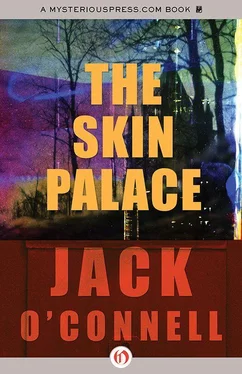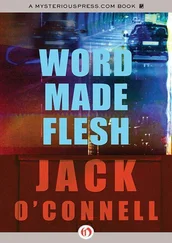Before she can answer he says, “You haven’t. I know you haven’t. Except for college, you’ve never lived outside of Quinsigamond.”
They come to a stop next to a booth where a small, professorial-looking man in a white lab coat is distributing leaflets on something called the Dillinger & Hindenmacher Miracle Implant Clinic in Tijuana, Mexico. On a rickety wooden easel next to the booth is a poster showing what looks like a technical blueprint for a zeppelin.
“I lived in Bangkok for three years. I lived in one room in the heart of Patpong Road. I had one change of clothes, a Nikon, and a Polaroid passport camera. For three hours every morning I shot Polaroids. Visa shots. Immigration shots. Rest of the day and night I shot for myself.”
“Look, Propp,” Sylvia says, “I’ve read stories about Bangkok—”
“Listen to yourself. Read stories.”
“Fine. It’s secondary. It’s worse than secondary. It’s nothing. I’m carnally illiterate. And you’ve been around. You’ve taken the big trip upriver to the core of all desire. You saw the best and worst of it. And now you’re enlightened. You’re the maven of all things sexual. And the rest of the world just can’t keep up. The Proppists are spoiled children with some storybook dream of this romantic, dewy sensuality. And Hugo Schick is just a cold businessman who knows how to exploit a raw image until it makes a respectable profit. And I guess I’m just a blank slate who hasn’t even considered the possibilities. So we’ve got no right to an opinion, because they’re all going to be uninformed.”
He rubs at his eyes, looks at his feet. “That’s not it at all. That’s not what I’m saying at all. Bangkok has no corner on carnality or lust or lasciviousness or whatever. Neither does Amsterdam. Or Forty-second Street. Or this flea market.”
“Okay,” Sylvia says. “Agreed.”
His voice changes slightly, gets huskier, a little tired. “I’ve spent large chunks of my adult life studying and capturing images, Sylvia. I’ve lived as a photographer. You know what that is. You know what that does to your eye, how it affects the way you view the world in every second you’re awake. And maybe when you’re asleep. You frame everything. You weigh every visual against an approaching better one. You do that over a number of years and it changes you. It makes you a mutant. But it happens so subtly that you might not even be aware of your own transformation.”
She looks at him and his face seems to be losing color, as if pigment is draining away as he speaks.
“When I became aware of what had happened to me, to my sensibility, I went, very literally after a time, underground. I’ve been around, as you sarcastically say. And you want to call the results of my experiences ego. That’s fine. But I know it has nothing to do with ego. And I’ll stand here and judge the Proppists. And I’ll judge Hugo Schick and the Skin Palace people. Because I know how wrong they both are. How ignorant. They don’t have any idea how deep it goes inside us. They approach image as if it were a theory. Or a commodity. They’re on opposite sides of a ridiculous fence, but both groups are fools. I know it, Sylvia. That makes me a fanatic. I don’t care.”
She takes a breath and says, “What about me?”
“I came for you, didn’t I?”
“Why?”
“Because I owe you, Sylvia.”
And she doesn’t want to ask what he owes her. Why he owes her. She stares at him and she thinks of Hugo Schick’s face. And then of Perry’s face. Propp steps up to her, leans in and kisses her, so softly, on the forehead. He puts his hands on her shoulders and turns her until her back is to him and she’s staring across the aisle at a display for self-adhesive mirrored ceiling tiles. Sylvia looks into the mirrors, sees the quilted jacket zipped over the remains of her Victorian nightgown, sees the white-gone-black slippers still on her feet. And then she looks into her own face, smudges of ash on her left cheek, her eyes bloodshot, dark circles underneath. She knows she looks horrible.
There are similarities between you and she, Propp had said back in the station. Similarities between Sylvia and the Madonna. Was he lying or was that genuinely his view of how Sylvia looked through the camera lens? You’re beautiful, he said.
Could what they see possibly be this different?
She looks from her reflection to Propp’s, his face behind her, back over her left shoulder. He looks equally haggard. Then there’s another face next to Propp’s and they both turn around to the smile of this old butterball, this pasty-skinned man who looks like a boozy ad man who’s finally gone to ruin. He’s got jowls and a head of bristly, pepper-colored hair and a brown suit with stained lapels. The fat man nods his head as he smiles and the jowls swing and Sylvia has to look down at the floor.
“Mr. Smith,” he says to Propp in this high-pitched voice like a muted horn, “could I have a word?”
Propp gets a little distracted. He looks from the man to Sylvia and back to the man, then says, “Sure, fine, just a second,” then pulls Sylvia out of earshot and says, “I’ve got to talk to this guy for a second.”
“Mr. Smith?” she says.
He shrugs. “It’s a joke around here. Everyone’s Mr. Smith.”
“You do business down here, Propp?”
“It’s not what you think, Sylvia. Could you just wait for me down in back and I’ll be there in five minutes.”
And he turns back to the fat man who huddles down and starts to talk fast. Sylvia moves past them and hears the words credit and fraud. She walks all the way to the rear of the building and comes to a row of what look like glossy, wooden confessionals or maybe those old arcade photo booths where you cram inside on a stool and they spit out four black-and-white head shots on a long, single print-strip. There’s a security guard sitting on a stool looking bored next to one of those velvet partitioning ropes that blocks entrance to the booths. He stares at her with his arms locked across his chest. She nods to him but he doesn’t move a muscle. She turns to walk away and the guard says, “You Sylvia?”
She turns back and stares at him and he lets a little smile break and says, “Yeah, you’re Sylvia,” and unhooks one end of the velvet rope to let her through.
She doesn’t move and he says, “Booth number seven.”
She looks down the rows of booths, finds the one marked 7 and, of course, there’s a hand-lettered Out of Order sign pinned to its curtain. She moves past the guard to the booth, pulls back the curtain and enters, ten years old again and trying to remember her sins. The booth is pretty stark. There’s a wooden stool to sit on, a metal coin box that reads quarters only and a mesh speaker set in the paneling next to a plate glass window that’s shuttered with what looks like corrugated metal. Sylvia resecures the curtain behind her and stands still in the dark.
There’s a second of motor noise as the metal shutter slides up and reveals a darkened, matching, booth-like room on the other side of a thick-glass window. Then blue and red ceiling spotlights click on and Leni Pauline is standing in front of her.
She’s dressed in this extremely short, black, see-through robe that she has barely belted around her waist. The floors and walls and ceiling of the booth surrounding her are carpeted in what looks like unusually plush bearskin. Leni clasps her hands behind her neck and does these back arches as if she were about to start into an aerobics routine. Then she bows toward Sylvia and says, “This is a freebie so don’t expect the full five minutes.”
“Where the hell did you go?” is all Sylvia can think to say.
Читать дальше











